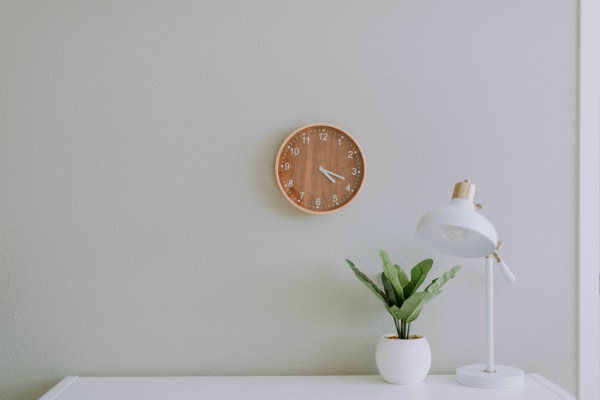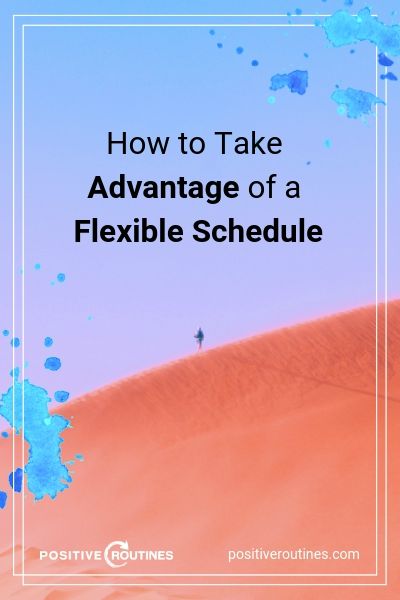If you happen to occur to happen to work someplace that gives a flexible schedule, congrats—you’ve got the possibility to maximise your time and energy for a larger life in and out of the office. The one state of affairs? Loads of us don’t know what which suggests or how you are able to do it. If used properly, a flexible schedule can be your ticket to persistently productive days which will be moreover persistently low stress. The idea is to work in case you’re at your sharpest, leisure and loosen up in case you’re not, and slot throughout the completely different odds and ends the place they make the most of sense.
It sounds simple. And it could be. Nevertheless you need to know what works for you sooner than you assemble your very good versatile schedule. Fortunately, we could assist you to do that. With the correct questions and a little bit of experimentation in your half, you probably can set up your private distinctive energy patterns to make a schedule that works best for you. Let’s get started.
What’s a Versatile Schedule?

First, let’s dig into what versatile schedules really are.
A flexible schedule is one which may be adjusted to fit your specific individual needs. You may be capable of set your private hours totally, choose them from a selected time window, work longer days to accommodate shorter ones, and so forth.
Some firms have specific flex-time insurance coverage insurance policies, some are further open, and some, like for people who work for themselves, are totally relying on you. It’s a job perk that’s becoming increasingly more in type. And it comes with some notable benefits. Let’s dive into a few examples.
3 Evaluation-Backed Benefits of Versatile Schedules
1. A lot much less ache and additional satisfaction

In a present study, manufacturing workers had been randomly assigned to a morning, night time, or night shift, irrespective of their personal sleep patterns. These assigned to the shift that best matched their sleep schedule preferences reported feeling the least discomfort and ache whereas at work and had been basically essentially the most pleased with the work setting.
So what does that suggest for you, whether or not or not you’re a shift worker or not? You’ll actually really feel your best at work in case your hours line up collectively together with your pure sleeping patterns and rhythms. If you happen to occur to’re a night owl, take into consideration starting a bit later throughout the day to prioritize your sleep and maximize your energy. Early fowl? Start your day without work vivid and early for comparable benefits.
2. Greater sleep

Everyone knows that sleep is vastly important for our properly being, productiveness, happiness, and additional. And one among many largest benefits of a flexible schedule is the possibility to get increased and higher top quality sleep. Or so says science.
In an identical study as a result of the above, researchers requested manufacturing facility workers to keep up observe of their sleep sooner than and after being assigned to work shifts that match their sleep chronotypes. The workers reported getting significantly further sleep and higher-quality sleep as quickly as they started using the appropriate versatile schedule. Staff whose shift assignments had been most severely mismatched with their pure sleep patterns sooner than the swap gained about half-hour of further sleep on workdays.
And half-hour may make an infinite distinction to your alertness, focus, productiveness, and additional.
3. Elevated productiveness

Aside from feeling increased and sleeping further, versatile schedules can also improve productiveness, primarily based on a 2015 survey of firms all through 10 nations. Eighty-three % of firms that started using versatile schedules reported an enchancment in worker productiveness, and 61 % reported that their earnings elevated. With earnings and workers’ wants aligning so correctly, it’s seemingly that this versatile working movement will proceed to develop.
The Key to Making a Versatile Schedule Work

You possibly noticed that these real-life success tales protect coming once more to the importance of scheduling your day spherical your pure sleep pattern. Inside the evaluation world, these are known as circadian rhythms or pure sleep chronotypes. And the proof strongly signifies that they’re an essential contemplate making a flexible schedule provide the outcomes you need. So what are the chronotypes?
For starters, the most common chronotype is the middle one, primarily based on evaluation. About 30 % of the inhabitants falls into this class, throughout which of us sleep between about 11:00 p.m. and 7:00 a.m. on work nights and about one or two hours shortly weekends. Early and late chronotypes fall on each side of the middle type, which signifies that it’s far more frequent to be close to widespread than the extremes.
To be specific, solely a blended eight % of people fall into the “extreme late” and “extreme early” chronotypes. On account of typical working hours, late chronotypes normally are inclined to sacrifice sleep all through the week by going to mattress later nevertheless waking up near the an identical time as common and early chronotypes.
You possibly know in case you occur to are prone to fall into an early, heart, or late chronotype merely from the define, nevertheless let’s discuss one other strategies you probably can dig into your personal rhythms. If you nail down your rhythm, you probably can assemble your schedule in a strategy that best helps it.
Learn the way to Determine Your Private Physique Clock
Listed beneath are some expert-recommended strategies that may help you identify your sleep chronotype.
1. Observe your sleep fastidiously for in any case each week

You need to make the most of an app or a paper journal, as prolonged you make sure that to hint every the quantity and top quality of your sleep. The usual measurements must embody notes about how prolonged it took you to actually really feel completely alert after waking up. With these notes and a dedication to experimenting with completely completely different sleeping and rising events for a few weeks, you’ll get the data you need.
2. Keep in mind (or take into consideration) a chilled trip

Important sleep chronotype researcher, Dr. Till Roenneberg, supplies a shortcut spherical sleep monitoring. Suppose once more to basically essentially the most laid once more trip you probably can consider—one which overcame alarms, work obligations, and distractions. When did you naturally get sleepy and rise up all through that leisurely week?
If you happen to occur to’ve in no way expert such a restful week (accountable), imagining each week on the seaside could assist you to obtain insights about your pure sleeping pattern. If all else fails, see method one.
A phrase about energy ranges…

One issue to recollect is that our energy ranges are normally not meant to stay fixed all day. And science confirms it. Most people experience a small nevertheless essential dip in alertness about twelve hours reverse from their pure deepest sleeping time, primarily based on the Nationwide Sleep Foundation. Scientists title this afternoon lull “sleep/wake homeostasis”. In numerous phrases, you’ve been awake prolonged enough that your physique sends you a not-so-subtle suggestion that it may very well be time to loosen up.
Irrespective of your chronotype, your strongest wave of alertness comes throughout the morning, and likewise you experience a second wave of alertness throughout the night time as you rebound from the afternoon energy lull. It’s important to know this because you’ll want to take into consideration the stoop as you propose your schedule.
Versatile Schedule Dos and Don’ts
Now that you have a larger sense of your sleep rhythm, you probably can create a schedule that matches it. Listed beneath are a few strategies to line them up.
Do match your duties to your every day circadian rhythm

Profit from your versatile schedule by doing all of your most demanding duties in case you’re most alert. No matter your chronotype, which suggests you take in your largest downside throughout the morning. When your energy fades throughout the afternoon, you’ll be able to do some a lot much less demanding work.
See this put up for further particulars about how one can get your most important work completed throughout the morning.
Don’t energy your self to do important work at mismatched hours

Everybody is aware of that working in the direction of your pure sleeping pattern is unpleasant. Evidently it will probably even have uncommon and alarming outcomes. In a present experiment involving a dice-rolling recreation with money prizes, people who had been pressured to point up on the laboratory on the inaccurate end of their sleep chronotypes had been about 17 % further susceptible to lie of their efforts to win.
Clearly, it’s best to go away your most important work to those events in case you’re not morally compromised. Or exhausted.
Do set widespread deadlines and routines

With the freedom of a flexible schedule comes the accountability to keep up your self on prime of your work. In numerous phrases, it’s wise to embrace the world of Pomodoro timers and Kanban boards. Which means making every day use of productiveness and goal-setting strategies.
Tie all of it together with an in depth every day planner akin to Panda Planner, which helps you prioritize your most important duties and get them completed. Day-to-day.
Don’t set unrealistic expectations on your self

When planning your day, it’s easy to picture your self knocking out primary targets in prolonged stretches of uninterrupted work time. We love the optimism. Nevertheless we don’t love unrealistic expectations. To keep up your self from feeling disenchanted or pissed off, protect your expectations in confirm. An achievable most aim for demanding work is about three or 4 hours per day, primarily based on evaluation outlined in Rest: Why You Get Further Completed When You Work A lot much less. (A lot much less demanding duties don’t rely in the direction of this entire.)
2 Major Templates for Developing Your Custom-made Versatile Schedule

So why a flexible schedule is crucial, some research-backed benefits, how one can resolve your physique clock, and strategies to line up your day collectively together with your rhythm. The final word piece is unquestionably setting—after which sticking—to that schedule. Fortuitously, we now have two easy strategies in an effort to do that. And neither one is as radical as you might assume.
- Slide your every day start time earlier or later throughout the morning, usually by one to three hours nevertheless by further when you’ve got an extreme sleep chronotype. With this schedule, it is best to cope with your most troublesome work throughout the morning and go away the easier duties for in case you’re a lot much less alert throughout the afternoon. This schedule leaves the overall night time for personal use.
- Break up your workday into two chunks. Start the first one at your pure waking time and the second throughout the night time coinciding collectively together with your second pure circadian extreme. The afternoon energy dip is good for guilt-free relaxation, leisure, a nap, family time, practice, or any of the alternative unbelievable points we do after we’re not busy working.
To sum all of it up…
A flexible schedule is a straightforward different to be every further rested and additional productive, as long as you understand how to utilize it. We hope this temporary data helps you identify your pure sleeping pattern and design a flex schedule that’s good for you. It’s a set of simple adjustments to sync up your work requires collectively together with your physique, so that you just simply’re further susceptible to get throughout the zone when it’s a must to get points completed. Top-of-the-line half is that these effectivity constructive components rework into further time and energy for the belongings you’re keen on exterior of your working life.
Your flip: Do you’ve got any further concepts or strategies for cashing in on a flexible schedule? Inform us all about ’em throughout the suggestions.
Do you set your private hours whereas working from dwelling? Strive our expert-backed concepts for working remotely.

Author: Scott Trimble
Scott researched human motivation at The Faculty of Texas at Austin. He spends most of his time touring, learning, instructing, and writing.
